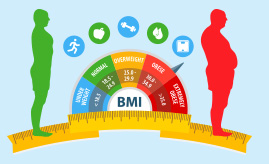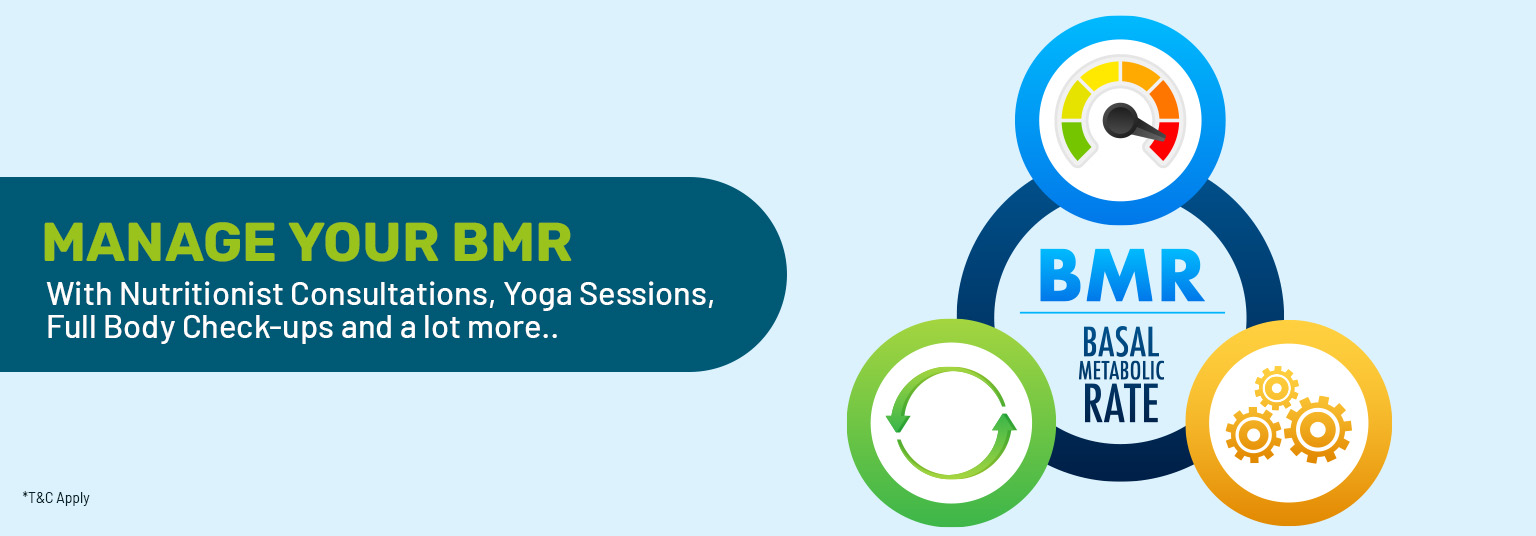Age years
25
Height
weight Kg
70
BMR =
0
Calories/day
Daily activities?
Daily calorie needs based on activity level
Overview -BMR Calculator
Overview -
BMR Calculator
Have you ever noticed that your trousers are getting a little tight around the waist, despite the fact that you continue consuming the very same nutrient-dense diet and exercise the same way you used to?
The reasonable explanation is obtained with the concept of the basal metabolic rate (BMR). BMR makes up roughly 60%–70% of the total calories burned per day. It is used to determine whether your body burns the food you eat or accumulates it as fat.
Knowing your BMR may allow you to figure out what to eat that’s best for your body type, and making use of a basal metabolic rate calculator is a simple way to determine this number.
Moreover, understanding what exactly a basal metabolic rate calculator is used to measure and knowing ways to change your BMR could help you get one step closer to your health goals.


Basal metabolic rate (BMR)
The quantity of energy used by the human body while it is entirely at rest is known as the basal metabolic rate. It is the quantity of energy needed by the body to support vital functions of the human body, including blood circulation, breathing, body temperature regulation, and nerve and brain functions.
Now, an interesting fact is that our body spends more energy regulating fluid volumes and ion concentrations than it does doing mechanical work of muscle contraction, for instance, while breathing. This is because our body automatically corrects the concentrations and quantities of different substances required in different parts of the body through various cell membranes in order to maintain homeostasis (a state of stable internal conditions). This whole process requires a lot of energy.
In addition to this, people usually consume more energy than their BMR. This is because, generally, people do not stay in bed all day without moving. They are involved in a variety of activities such as walking, running, cycling, working, or even speaking and digesting what is eaten, and all these activities need more energy than a person’s BMR.
Based on your activity level and lifestyle, the BMR makes up roughly 60% to 70% of the total expenditure of energy. The total amount of expenditure of energy equals the total number of calories burned per day. The remainder of your total expenditure of energy is derived from physical activities (for example, talking, walking, and eating), which account for roughly 20%, and food digestion, which accounts for approximately 10%.
BMR decreases as one gets older and has less lean body mass. Increased muscle mass, on the other hand, will almost certainly increase your BMR.
A BMR calculator is used to determine the total number of calories necessary for maintaining vital body functions.
How to use the BMR Calculator?
Knowing your BMR can help you estimate the minimum number of calories your body requires to function. This information can be used to calculate your total daily calorie consumption requirements. To get an accurate estimate, add your calorie consumption from various physical activities, such as talking and walking, to the BMR. You can also add 10% to your daily total energy consumption to account for digestion. This information can assist you in developing a weight-loss regimen that is specific to your needs.
BMR can be calculated using a number of methods, and the most common one is the Harris–Benedict equation. You will need the following information to calculate your BMR:
Your age (in years)
Weight (in kilograms): Preferably weight measured in the morning (you will get the most accurate results if you weigh yourself first thing when you wake up and without clothes on)
Do regular cardiovascular exercises and resistance training
Once all the information is gathered, you can enter it all in the BMR calculator or use the BMR calculation formula presented here:

Note: BMR calculation is distinct for men and women.
For Women
BMR = (9.99 x Weight [kg]) + (6.25 x Height [cm]) - (4.92 x Age [years]) - 161
For Men
BMR = (9.99 x Weight [kg]) + (6.25 x Height [cm]) - (4.92 x Age [years]) + 5
For example, I am a 34-year-old woman with a weight of 70 kg and a height of 160 cm. Here is my BMR:
BMR = 9.99 x 70 + 6.25 x 160 - 4.92 x 34 -161
BMR = 699.3 + 1000 – 167.28 − 161
BMR = 1371.02
So, approximately 1371 calories are my daily minimum calorie requirement.
What are factors affecting BMR?
Muscle Mass
Exercises, such as lifting weights, indirectly increase the BMR by increasing muscle mass, which increases resting energy consumption. The more muscle mass you have in your physical composition, the higher the BMR needed to maintain your body at that particular level.
Age
The older and more limber you are, the lower your BMR is, or the lesser the minimum of caloric consumption required to keep your organs functioning at a specific level is.
Genetics
The BMR is influenced by inherited traits passed from generation to generation.
Weather
The energy needed for maintaining homoeostasis in the body raises the BMR in cold climates. Similarly, excessive external heat could increase BMR as the body consumes energy to cool internal organs.
Diet
Small, evenly spaced meals raise the BMR. Starvation, on the reverse side, can decrease your BMR.
Pregnancy
Ensuring the survival of a separate foetus internally raises the BMR. This is the reason pregnant women typically consume more meals than usual. Menopause can also raise or lower the BMR based on hormonal fluctuations.
Supplements
Certain drugs or supplements can increase the BMR, primarily to aid in weight loss (for example, caffeine).
Muscle Mass
Exercises, such as lifting weights, indirectly increase the BMR by increasing muscle mass, which increases resting energy consumption. The more muscle mass you have in your physical composition, the higher the BMR needed to maintain your body at that particular level.
Age
The older and more limber you are, the lower your BMR is, or the lesser the minimum of caloric consumption required to keep your organs functioning at a specific level is.
Genetics
The BMR is influenced by inherited traits passed from generation to generation.
Weather
The energy needed for maintaining homoeostasis in the body raises the BMR in cold climates. Similarly, excessive external heat could increase BMR as the body consumes energy to cool internal organs.
Diet
Small, evenly spaced meals raise the BMR. Starvation, on the reverse side, can decrease your BMR.
Pregnancy
Ensuring the survival of a separate foetus internally raises the BMR. This is the reason pregnant women typically consume more meals than usual. Menopause can also raise or lower the BMR based on hormonal fluctuations.
Supplements
Certain drugs or supplements can increase the BMR, primarily to aid in weight loss (for example, caffeine).
Are the Resting Metabolic Rate (RMR) and Basal Metabolic Rate (BMR) the same?
The terms RMR and BMR are frequently used interchangeably. The two, however, differ slightly in terms of what they estimate and what the test encompasses.
The BMR is used to determine the minimum number of calories that a person requires every day in order to sustain basic life functions if they sleep for a complete 24 hours. To get a precise estimate, an individual must be monitored in a healthcare setting under strictly controlled conditions. These include:
On the other hand, the RMR measures the calories that are burned during the periods of inactivity. To obtain an estimate, individuals are not required to fast or sleep or rest for a prolonged period of time in a controlled environment. Because the RMR testing conditions are less rigorous than those required for the BMR, the results of the RMR could be a little less accurate than those of the BMR.
Eat a healthy diet
Do regular cardiovascular exercises and resistance training


What is the significance of BMR?
The BMR indicates how many calories an individual burns. This detail could be helpful to someone attempting to lose weight.
Calculating your BMR can help you figure out the number of calories you may need to cut out on a daily basis if you are trying to lose weight. In some circumstances, this could imply consuming only the calories that may be required to support basic life functions.
Additionally, if you wish to put on weight, you can calculate your BMR to determine how many additional calories you may need to consume every day.
How to modify the
Basal Metabolic Rate?
Calculating a person’s BMR involves several factors; however, only two of these factors are within an individual’s control: their weight and body composition. As a result, a person’s BMR can be altered by reducing weight, by gaining lean muscle mass, and decreasing body fat. To accomplish this, try the following:
Eat a healthy diet
Do regular cardiovascular exercises and resistance training


A note by LivLong
A BMR calculator is a valuable tool for those who want to lose weight and even for those wishing to gain it. The calculator can estimate the number of calories required for maintaining current weight and the number of calories necessary for creating a calorie deficit for weight loss by determining a person’s basal metabolic rate; however, keep in mind that the BMR calculator is only an estimate and that other factors can also influence an individual’s actual calorie burn. Finally, using the BMR calculator in conjunction with a balanced diet and regular physical activity can result in successful and long-term weight loss.
Other Calculator
Calculate as per your need

Ovulation Calculator
Planning a pregnancy! Use an Ovulation Calculator to help identify the most fertile window for your pregnancy

GFR Calculator
Concerned with your kidney health! Use a GFR Calculator, one of the best indicators of kidney function

Carb Calculator
Watching what you eat to achieve your fitness goals! Use Carb Calculator to track and manage your carbohydrate intake

Body Fat Calculator
Feeling overweight! Use Body Fat calculator, an extremely convenient method that does not need special equipment

Ideal Body Weight Calculator
Want to know the right weight for your Height! Use Ideal body Weight calculator to know what’s the healthy weight as per your height

BMI Calculator
Are you underweight or overweight! Use BMI Calculator to find out the optimal weight with respect to your height

Period Calculator
Want to predict your menstrual cycle! Use Period Calculator to help you know your next period date

Pregnancy Calculator
Planning a family! Use Pregnancy Calculator to know what stage of pregnancy you are and your estimated due date

Protein Calculator
Want to know how much protein to consume daily! Use Protein Calculator to find out how much protein is recommended for daily intake

TDEE Calculator
Want to manage weight as per your health goals! Use TDEE Calculator to know how much energy is burned during a day
BMR Calculator FAQ'S
Join 2,00,000+ subscribers who get personalised health tips in their inbox










